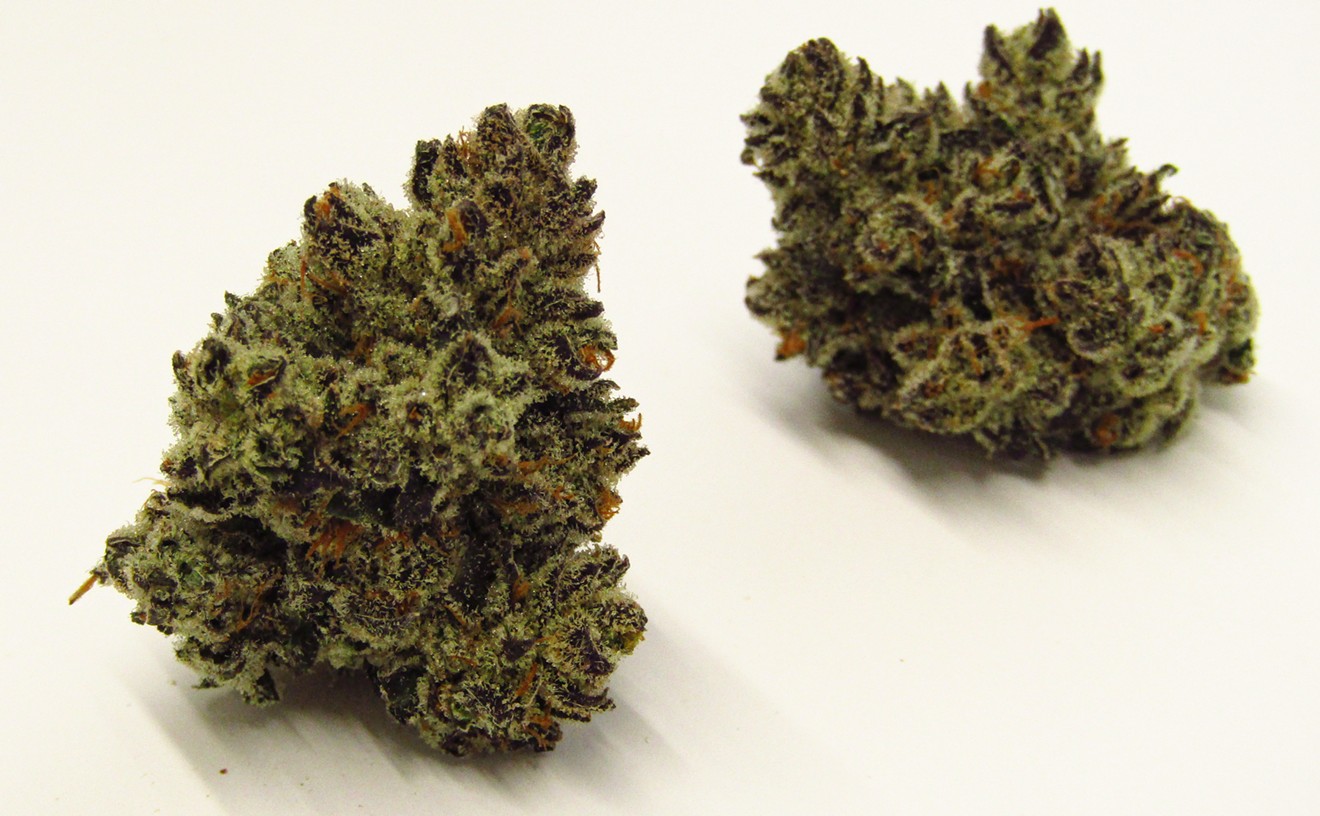The April 19 event was a lead-up to the Mile High City's April 20 festivities, with Colorado Department of Transportation officials using it as an opportunity to inform residents and visitors about the dangers of driving stoned.
"We've been educating people about the dangers of alcohol and driving for decades," says Sam Cole, a CDOT spokesperson for road safety. "We've had enormous success when it comes to that, and we don't want it to take twenty or thirty years to get the message through to people that impaired driving is dangerous and costs lives on our roadways."
Over the years, CDOT and law enforcement officials have teamed up with dispensaries to hold impaired-driving events like these as a way to try and reduce traffic deaths — which have jumped since the COVID-19 pandemic.
On a scale of 0 to 10 — with 10 being the highest they've ever been — the three volunteers who participated said they were a 4, 6 and 7, respectively.

The CDOT booth at this year's Mile High 4/20 Festival at Civic Center Park.
Department of Transportation
"It's not about the ticket. It's not about the charges. It's not about anything but people dying on our roadways," Sergeant Roger Meyers, a state patrol trooper, says of the faux DUI exams. "Nationwide, we've seen a monstrous increase in people dying on our roadways in the United States, and that's what we're out there trying to prevent."
The past few years have been some of the most dangerous for Colorado roadways. In 2022, CDOT recorded 684 fatal crashes and 760 overall deaths, including pedestrians. Roadway deaths haven't been this high since 2002 — when there were 677 fatal crashes — and were trending downward until the pandemic.
In 2021, 691 people died on Colorado roads: a 55 percent increase from the number of statewide road deaths in 2011. According to CDOT data, 37 percent of road deaths in 2021 were caused by drivers who were drunk, high or both.
The department recorded a total of 271 impaired-driver deaths in 2021, which was a 6 percent increase from 2020 but nearly a 60 percent increase from 2019. In 2022, a quarter of the drivers who died from impaired driving had a combination of alcohol and drugs in their blood — with alcohol and cannabis being the most common pairing, CDOT says.
The numbers showing how many stoned drivers have been involved in fatal accidents come from 2020, when 48 accidents involved drivers who had tested above the legal limit of 5 nanograms.
In 2019, Colorado saw 59 fatal accidents involving drivers above the legal cannabis limits.
These THC fatalities involved drivers who had "active" THC in their system, which means Delta-9 THC is causing impairment, as opposed to inactive THC, which has already been metabolized in a person's body and can often remain for weeks, according to CDOT.
The numbers showing how many stoned drivers have been involved in fatal accidents come from 2020, when 48 accidents involved drivers who had tested above the legal limit of 5 nanograms.
In 2019, Colorado saw 59 fatal accidents involving drivers above the legal cannabis limits.
These THC fatalities involved drivers who had "active" THC in their system, which means Delta-9 THC is causing impairment, as opposed to inactive THC, which has already been metabolized in a person's body and can often remain for weeks, according to CDOT.
For 2023, the number of roadway deaths in Colorado is currently looking at a 10 percent decrease from last year, but the number of deaths involving impaired motorists is still trending upward. Much of this has to do with drivers taking advantage of a reduced police presence during the COVID-19 pandemic, resulting in increases in distracted driving, speeding and impaired motorists, according to Meyers. More than a third of last year's traffic fatalities were caused by impaired driving, he says.
Alcohol is the most common cause of driver deaths in Colorado, but more drivers in the state are being caught driving above the legal cannabis limits. In 2020, the police caught fifty people driving above the legal THC limits. In 2021, that number jumped to 79.
The 5-nanogram limit was set in 2013, shortly before recreational pot sales began. CDOT and other state officials have admitted that the limit isn't based in reliable science and note that THC can affect people differently. In addition, pot impairment still can't be detected with a breathalyzer device the way it's done for alcohol.
At the April 19 edibles demonstration, CDOT and law enforcement officials provided information on how voluntary blood tests can be taken after a driver is pulled over and arrested for a DUI, but the results of these tests can take about six weeks to return. Drivers can still have charges dropped or reduced if they test above the 5-nanogram limit by proving they weren't impaired at the time.
The 5-nanogram limit was set in 2013, shortly before recreational pot sales began. CDOT and other state officials have admitted that the limit isn't based in reliable science and note that THC can affect people differently. In addition, pot impairment still can't be detected with a breathalyzer device the way it's done for alcohol.
At the April 19 edibles demonstration, CDOT and law enforcement officials provided information on how voluntary blood tests can be taken after a driver is pulled over and arrested for a DUI, but the results of these tests can take about six weeks to return. Drivers can still have charges dropped or reduced if they test above the 5-nanogram limit by proving they weren't impaired at the time.
"Alcohol is the main substance involved in those deaths or crashes," Cole says. "But we are seeing a sharp incline, especially lately, in the number of fatalities above the legal limit for cannabis."
CDOT is "still having a lot of trouble convincing people about the dangers of driving high," Cole admits. The agency is developing a new ad campaign to emphasize the financial disaster that DUIs can leave in their wake for individuals.

Sergeant Glenn Thomas (back left) from the Colorado Springs Police and Corporal Jim Gates (bottom right) from the Denver Police Department look for eye twitches in a volunteer.
Bennito L. Kelty
After Colorado legalized recreational marijuana, CDOT began hosting focus groups with cannabis users to find out if there was anything they didn't know about the new law, and one of the first things people said was that they didn't know they could get a DUI while driving high, Cole says.
Outreach has worked in the past, according to CDOT officials, but only when combined with "strict enforcement" driver safety laws. They cite the success education has had in stemming alcohol-related deaths: Roughly half of Colorado roadway deaths in the 1980s and 1990s involved alcohol, but now that fraction is down to less than a third.
Similarly, only about 65 percent of Colorado drivers wore their seat belts decades ago, Cole says — but now about 90 percent of the state's drivers do so.
"It's awareness campaigns working alongside strict enforcement that's making the difference," he says.
With psychedelic mushrooms now legal in Colorado, CDOT was also ready to answer any ’shroom-related questions at the 4/20 festival, and will be at subsequent events; they'll deal with psychedelics "in their overall campaign…as one of many substances that can impair,” Cole adds.
Drivers aren't subject to arrest if they have mushrooms on them when pulled over by law enforcement, CDOT says. If they have too many, though, they could get charged with distribution. And if a cop determines through roadside impairment tests that a driver is under the influence of psychedelics, they'll definitely get a DUI.
While no mushrooms were available at the April 19 demonstration, there's always next year.












